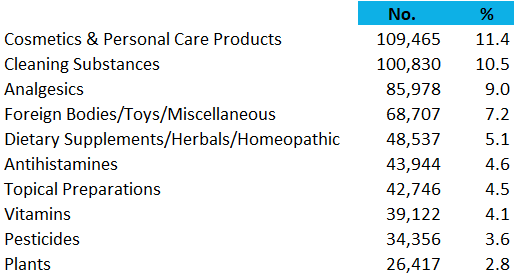|
In 2019, the 55 U.S. poison control centers provided telephone guidance for over 2.1 million human poison exposures.1 That's about:
While young children (younger than 6 years) comprise a disproportionate percentage of the cases, poisoning affects ALL age groups, from infants to seniors. Peak poisoning frequency occurs in one- and two-year-olds, but poisonings in teens and adults are more serious. Notice that the greater proportion of males in poison exposures occurring in children younger than 13 years switches to a female predominance in teens and adults. Across all ages, there were 643 poison exposures reported per 100,000 population. The highest incidence occurred in one- and two-year-olds (7,047 and 6,667 exposures/100,000 children in the respective age groups). For ages 50 years or older, 249 exposures were reported per 100,000 population.1 Children younger than 6 years comprise nearly half of poison exposures (43%), followed by adults (42%), then teens (8%). What are the most common substances implicated in poison exposures? Cosmetics and personal care products lead the list of the most common substances implicated in pediatric exposures (children younger than 6 years, NPDS, 2019). Cleaning substances and pain medications follow. These exposures are nearly always unintentional. https://www.poison.org/poison-statistics-national https://www.ncbi.nlm.nih.gov/books/NBK310644/
0 Comments
All kids and adults lose water constantly throughout the day. Water evaporates from the skin and leaves the body when you breathe, cry, sweat, and use the toilet.
Most of the time, a toddler/child gets enough water from eating and drinking to replace the fluids they lose. But in some cases, kids can lose more water than normal. Fevers, stomach flus, being out in hot weather, or too much exercise, for example, may result in too much fluid loss. This can lead to dehydration. Dehydration isn’t something to take lightly. When it happens, the body doesn’t have enough fluids and water to function properly. In severe cases, your child can become delirious or unconscious. Dehydration could lead to brain damage or even death. Dehydration can happen very slowly over time, or it can happen suddenly. Toddlers with an illness, especially stomach flu, should be monitored closely for signs of dehydration. The warning signs aren’t always obvious. Don’t wait until your toddler/child is excessively thirsty. If they’re really thirsty, they may already be dehydrated. Instead, look out for these warning signs:
https://kidshealth.org/en/parents/dehydration.html https://www.healthline.com/health/parenting/signs-of-dehydration-in-toddlers#warning-signs Portable Fire Extinguishers and Children:
AGE APPROPRIATE. MATURITY MATTERS. PHYSICAL ABILITY MATTERS. NFPA believes that children should not be trained how to operate portable fire extinguishers. Teaching children to use portable fire extinguishers runs counter to NFPA messaging to get out and stay out if there is a fire. Furthermore, children may not have the maturity to operate a portable fire extinguisher properly or decide whether or not a fire is small enough to be put out by the extinguisher. They may not have the physical ability to handle the extinguisher or dexterity to perform the complex actions required to put out a fire. In the process of extinguishing flames, children may not know how to respond if the fire spreads. NFPA continues to believe that only adults who know how to operate portable fire extinguishers should use them. A portable fire extinguisher can save lives and property by putting out a small fire or containing it until the fire department arrives; but portable extinguishers have limitations. Because fire grows and spreads so rapidly, the #1 priority for residents is to get out safely. Fire extinguishers are one element of a fire response plan, but the primary element is safe escape. Every household should have a home fire escape plan and working smoke alarms. Safety tips
https://www.nfpa.org/Public-Education/Staying-safe/Safety-equipment/Fire-extinguishers |
Archives
September 2021
Categories
|


 RSS Feed
RSS Feed